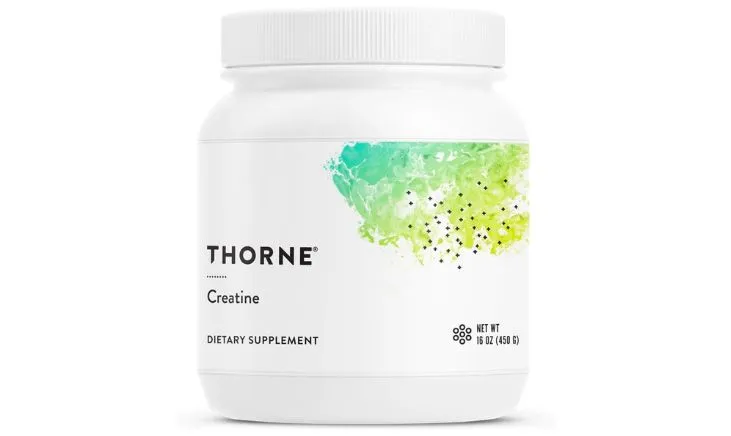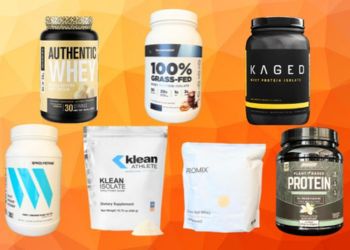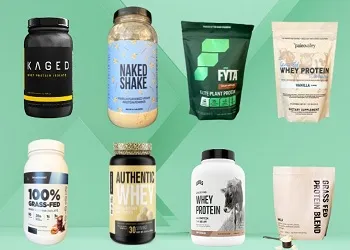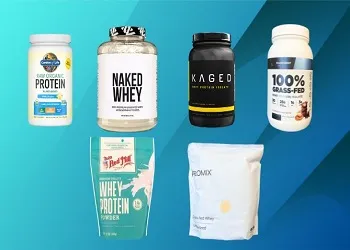There’s a lot of confusion about whether creatine is an amino acid. This article is dedicated to decoding the truth about creatine and whether the benefits and risks are worth purchasing as a supplement!
Quick Takeaway:
- Creatine is a chemical compound created by the body. It produces energy in the cells to enhance muscular growth and athletic performance.
- Most frequently used by athletes and fitness enthusiasts for its muscle-building properties and energy production, creatine is also used to treat muscular disorders and other conditions.
- There are so many creatine supplements out there, but only a few can be tagged as the best by promoting clean, high-quality ingredients like Transparent Labs and Thorne’s creatine supplements.
Table of Contents
Creatine Supplementation: What Is It?

Source: EverFlex Fitness 2024
Shockingly enough, more than half of our survey responders thought that creatine was an amino acid.
Creatine, produced in the organs by amino acids and enzymes, is a natural compound that creates energy and promotes muscle growth. But there’s so much more to creatine you should know about—like what it does and how it’s made. Find out more below!
What Is It?
Creatine is a chemical compound in the human body. It is naturally synthesized from three amino acids (arginine, glycine, and methionine) and two enzymes (arginine glycine amidinotransferase (AGAT) and guanidinoacetate methyltransferase (GAMT)).
What Does It Do?
Used to make adenosine triphosphate (ATP), a source of energy, creatine is responsible for producing energy in muscle cells. It is believed to be the most effective performance enhancement supplement for high-intensity exercise, promoting more significant muscle gains.
Creatine is indispensable for its energy metabolism functions throughout the human body. Deficiencies in creatine have been linked to severe issues, including:
- Cerebral creatine deficiency syndrome (CCDS)
- Seizures
- Movement disorders (dystonia, chorea-athetosis)
- Hypotonia
- Developmental delay
How Is It Made?
Creatine is mainly synthesized in the pancreas, kidneys, and liver. The body uses three specific amino acids and two enzymes to form creatine in these organs before distributing it to cells. There are different types of creatine in the human body to be aware of.
Previously known as creatine phosphokinase, creatine kinase is an intracellular enzyme. This enzyme is typically found in the most significant amounts in the brain, skeletal muscle, and myocardium, though it is found elsewhere in the body.
The primary energy molecule within the human body is creatine phosphate. In muscle, creatine phosphate has a maximal concentration five times greater than ATP. In times of great need for energy, creatine kinase will use creatine phosphate as an energy source.
The most common type in creatine administration of supplements is creatine monohydrate. Bound to a water molecule, creatine monohydrate is one of the most researched types of creatine in supplements. The effects of creatine monohydrate supplementation on health have been widely analyzed and shown to increase creatine stores in skeletal muscle tissue to increase energy production during high-intensity exercise.
Foods High In Creatine
The body naturally synthesizes creatine, so it’s not necessary to consume it. However, some foods contain creatine. None of these foods are vegetarian or vegan-friendly as these options are all meat-based, including chicken, salmon, and beef.
Foods High In Creatine:
- Milk
- Red meat
- Poultry
- Fish

Source: Everflex Fitness 2024
Oral Creatine Supplementation: Uses, Benefits, Health Risks, and Dosage
The effects of creatine supplementation on the body have been dutifully researched, providing us with all the ease of comfort as we reap the benefits of this powerful compound. From the benefits to the health risks, continue reading to learn more about the ins and outs of oral creatine supplementation!
Uses
Creatine therapy has become a popular method of treating loss in muscle mass and function in chronic and acute conditions due to its anabolic properties. Though there are studies confirming creatine’s potential to reduce adverse effects on physical function in numerous conditions, there are currently not enough studies to firmly grasp creatine as a potential healing aid in the medical field.
Even so, creatine treatment is still used by some medical professionals to promote therapeutic effects such as attenuating muscle disorders like Duchene or central nervous system diseases like Alzheimer’s.
Creatine Uses:
- Treating muscle disorders (inflammatory myopathies, Duchenne)
- Slows down amyotrophic lateral sclerosis
- Improved health in individuals with chronic obstructive pulmonary disease (COPD)
- Boost athletic performance
- Treat central nervous system diseases (Alzheimer’s, Parkinson’s)
Benefits
Creatine is one of the most popular supplements in the world for its ability to promote muscle mass and growth, so much so that nearly a third of National Collegiate Athletic Association (NCAA) D1 athletes reported using it for its benefits.
One study took randomized clinical trials and evaluated the effects of creatine. It concluded that creatine is confirmed to be a productive form of supplementation for muscle growth. Due to its fantastic health benefits, taking creatine supplements has become popular in promoting athletic performance for sports and resistance training and its impact on skeletal muscle mass.
Creatines Benefits:
- Increase muscle mass
- Improves exercise performance
- Supports skeletal muscle cells
- Boosts muscle strength
- Benefits brain health
- Reduces skin aging
Health Risks & Side Effects
There have been many claims on the negative effects of creatine supplementation. As of recent, many of these claims have been boldly pushed aside due to a lack of sufficient proof or research.
Taking extra creatine can damage the kidneys, so following the instructed dosage provided on the label is highly advised.
Creatine Health Risks & Side Effects:
- Diarrhea
- Kidney disease
- Muscle cramping
- Muscular dystrophy
- Heart failure
Dosage
The recommended creatine dosage surmounts a daily intake of 3-5 grams. Taking 20 grams divided into four daily intakes of 5 grams paired with a protein and a carbohydrate is advised for optimal absorption.
Best Creatine Supplements
Due to its heavily researched background, creatine monohydrate supplementation is among the most popular oral creatine supplements for athletes and fitness enthusiasts. Here are two of the most noteworthy creatine supplements for optimal results and guaranteed clean ingredients!
Transparent Labs Creatine HMB – Best Clean Ingredient Pick

Overview
Notorious for its dedication to promoting transparency in its labeling and brand, Transparent Labs is also well-known for its outstanding supplements. One such example is their Creatine HMB supplement.
Free of artificial ingredients or additives, this creatine supplement by Transparent Labs promotes endurance, strength, and lean muscle mass. It is the ultimate supplement to promote gains and improve athletic performance in athletes and fitness enthusiasts.
Highlights
- No artificial sweeteners
- No artificial coloring
- No artificial preservatives
- Gluten-free & non-GMO
- There are many delicious flavor options to choose from, including:
- Blue Raspberry
- Hawaiian Splash
- Peach Rings
- Sour Grape
- It incorporates the widely researched creatine monohydrate for its incredible health benefits
- Benefits from this supplement include:
- Increased endurance
- Enhanced strength
- Promotes lean muscle mass
Price
| PRODUCT | AMOUNT | PRICING |
|---|---|---|
| Transparent Labs Creatine HMB | 297g/0.65lbs | $49.99 |
| Transparent Labs Creatine HMB | 594g/1.31lbs | $89.99 |
Bottom Line
Get your hands on this powerful creatine supplement by Transparent Labs. Completely free of artificial fillers, this supplement boasts creatine monohydrate for impactful gains and enhanced performance in the gym!
Thorne Creatine – Best Non-Flavored Choice

Overview
Thorne Supplements has done it again with its outstanding creatine monohydrate powder.
This product combines the heavily researched benefits of creatine monohydrate into one supplement. It provides all the powerful benefits of creatine to support cellular energy production, promote lean body mass, and promote physical endurance. The creatine powder supplement is easy to mix with enhanced solubility using a micronized form of creatine monohydrate that is NSF-certified for Sport.
Highlights
- Gluten-free
- Dairy-free
- Soy-free
- Derived from natural colors & flavors
- This creatine supplement promotes the following:
- Lean muscle mass
- Endurance
- Cellular energy
- Brain function
- Injury prevention
- Nutritional support
- NSF Certified for Sport
- Easy to mix with enhanced solubility
Price
| PRODUCT | AMOUNT | PRICING |
|---|---|---|
| Thorne Creatine | 16oz/450g | $40 |
Bottom Line
If you want a creatine supplement that’s easy to mix with your protein smoothies or other dishes like protein overnight oats, this product is for you. Thorne’s creatine monohydrate powder is perfectly mixable and provides all the advantages of creatine to enhance progress and health!
Frequently Asked Questions
What is creatine monohydrate?
Creatine monohydrate is the most popular form of creatine used in dietary supplements. It is also the most researched because of its ability to promote outstanding results in energy production and muscle growth.
Why is creatine not an amino acid?
Creatine is not an amino acid. Instead, it is synthesized by three amino acids: methionine, glycine, and arginine. With the help of these amino acids, creatine is produced naturally in the body.
What type of protein is creatine?
Creatine is not a protein, nor is it an amino acid. It is a compound bound by a water molecule and created naturally in the human body. When consuming a creatine supplement, the body better absorbs this beneficial compound with a carbohydrate and a protein.
Do I need amino acids if I take creatine?
Yes, the human body still requires amino acids. For one, creatine is made through the use of amino acids. Amino acids also have unique functions that promote overall health that could not otherwise be overtaken solely by creatine supplementation.














